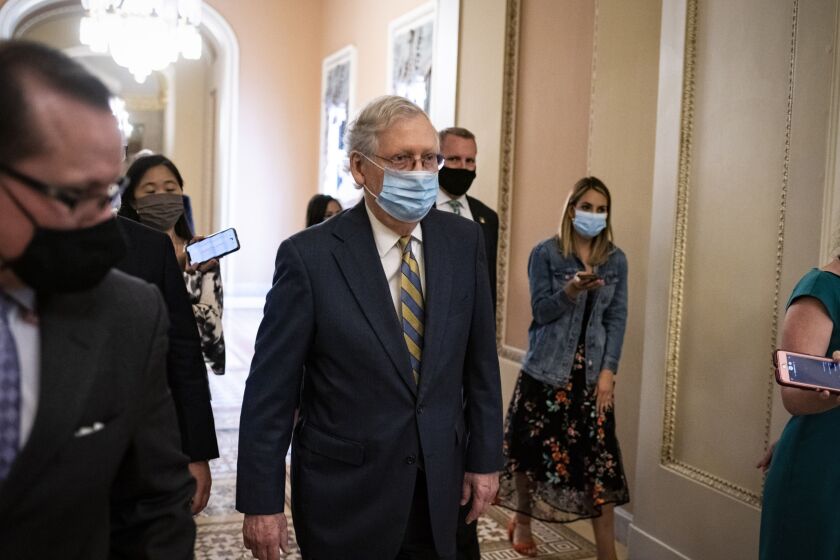Republicans will likely block Democrats’ attempts to have the Senate follow the House in boosting stimulus payments for most Americans to $2,000, even though President Donald Trump backs the bigger checks.
Forty-four House Republicans joined 231 Democrats on Monday to pass a bill increasing the payments from the $600 in the pandemic relief legislation Trump signed on Sunday. His surprise demand last week for bigger payments put Republicans in a bind after they resisted anything higher than $600 during the drawn-out negotiations on the original bill. Democrats were quick to use that as a pressure point.
As Filed co-founder & CEO, Leroy Kerry leverages expertise from scaling some of Europe's fastest-growing fintechs, including scaling Iwoca from a team of 5 to unicorn status to serving as a founding member at Juni. Leroy's experience blends strategic growth, operational scaling, and talent development, uniquely positioning him to transform legacy industries through technology.
Christian Greyenbuhl, Chief Financial Officer at Ministry Brands, is a high performing finance leader who brings operations and finance experience through a variety of senior roles in global public and private companies. He was most recently responsible for leading Xplor Technologies' FP&A, M&A, and Investor Relations functions. While at ADP he was the General Manager of Globalview North America; prior to which he held various senior finance leadership roles including SVP Investor Relations. He is both a Chartered Accountant with the Institute of Chartered Accountants of Scotland as well as a C.P.A. Christian has lived on four continents, speaks three languages, and currently lives in Georgia with his wife, four children and their Golden Retriever, Leo.
Phillip Toews is the CEO and a portfolio manager of the Toews Funds and Toews Agility Shares ETFs. He is a co-founder of the Behavioral Investing Institute and has appeared on CNBC, Bloomberg TV/Radio, Fox Business News and is quoted frequently in financial publications. His most recent book is "The Behavioral Portfolio: Managing Portfolios and Investor Behavior in a Complex Economy" (Harriman House 2025).
“The House and the President are in agreement: we must deliver $2,000 checks to American families struggling this Holiday Season,” House Speaker Nancy Pelosi said in a tweet, calling on the Senate to pass the higher payments.
Senate Majority Leader Mitch McConnell hasn’t said whether the Senate would take up the House bill, attempt to vote on a different one that would also increase direct payments or simply ignore the issue. Senate Democratic leader Chuck Schumer said he’ll seek unanimous consent to pass the House bill on Tuesday. But the move is expected to draw an objection from a Republican, effectively shutting down the effort.

Much depends on whether the president moves on from the issue or uses it to attack Senate Republicans.
He has expressed anger at McConnell and other GOP leaders for failing to back his quixotic attempt to overturn the election results. Now that the $2,000 checks issue is in the Senate, Trump may take to social media to draw continued attention to it and try to pressure Republicans to take action on the bill.
Trump started down that path early Tuesday morning. “Give the people $2000, not $600,” he tweeted. “They have suffered enough!”
McConnell is expected to speak about the issue when he opens the Senate for debate Tuesday afternoon. The Senate would likely need unanimous consent to be able to vote on both a defense bill veto override and the $2,000 checks legislation before this session of Congress expires on Sunday. Getting that agreement is unlikely.
That may leave it to the administration of President-elect Joe Biden, who has said he’ll seek an additional stimulus shortly after being inaugurated on Jan. 20. Yet whether he’ll have latitude to get additional relief through Congress will depend on the outcome of two runoff elections in Georgia on Jan. 5 that will decide control of the Senate. If Republicans hold on to just one of those seats, McConnell would remain majority leader and able to control the Senate agenda.
The House bill cleared the chamber on a 275 to 134 vote. In addition to increasing the payment amounts and the income cutoff to receive a check, the legislation would expand the eligibility of household members who can get the money, allowing adult dependents, as well as child dependents, to receive the payments. Currently, just children of adults under the income caps qualify for the payments.
The nonpartisan Committee for a Responsible Budget estimates that the bigger payments would raise disposable income in the first quarter to as much as 25 percent above pre-pandemic levels. The legislation would produce an additional 1.5 perent in GDP output, but not all of the growth would occur in 2021, according to Marc Goldwein, an economist who co-authored the CRFB projections.
But many Republicans had opposed stimulus payments larger than the $600 in the existing law, in part over concerns about the price tag. Bumping the payments to $2,000 would cost roughly $463.8 billion, according to estimates by the staff of the Joint Committee on Taxation.
“I worry that this whopping $463 billion won’t do what’s needed, stimulate the economy or help workers get back to work,” Representative Kevin Brady, a Texas Republican, said before the House vote. “It’s hard to stimulate the economy that is locked down by local politicians.”
‘No’ votes
Pennsylvania Republican Senator Pat Toomey said Sunday he would vote against $2,000 checks, and Senator Ron Johnson, a Wisconsin Republican, blocked an attempt to bolster the payments to $1,200 when the pandemic relief legislation was being debated. During months of COVID-19 relief negotiations, Republicans fought against any direct payments and insisted that $600 was the maximum they could support in this round of economic aid.
“Essentially what they believe is the economy will fix itself,” House Majority Leader Steny Hoyer said.
A vote against the increased payments would put Senate Republicans at odds with the leader of their party and on record against a politically popular idea, in a week that Republicans are trying to remain unified ahead of Georgia runoffs.
In that race, Democratic Senate candidates Jon Ossoff and Raphael Warnock both have called on the Republican incumbents, David Perdue and Kelly Loeffler, to support increasing the stimulus payments to $2,000. Loeffler said she would consider the increase if it is offset with spending cuts elsewhere; Perdue has not publicly taken a stand. If Schumer is blocked from his request for unanimous consent as expected, neither senator will be forced to cast an on-record vote.
The relief bill passed by Congress has already played a role in the Georgia contests. After Trump criticized the legislation, raising the prospect he might veto it, Perdue lobbied the president in a Christmas Day phone call to sign it, concerned that Trump’s delay would harm his and Loeffler’s chances in the runoff.
Trump called $600 stimulus checks a “disgrace” and asked Congress to increase them to $2,000 while cutting foreign aid and other unspecified “pork” from legislation that combines virus relief with funding for government operations. After days of complaints, Trump capitulated on Sunday night and signed the more than $2.3 trillion bill.
In a statement that accompanied his signing of the broader legislation, Trump said the Senate had agreed to begin the process of voting on the $2,000 checks along with a measure to reform unrelated liability protections for technology companies and an investigation into alleged voter fraud. McConnell hasn’t made any public statements about such an agreement.
— With assistance from Laura Davison, Jennifer Jacobs and Nancy Cook



